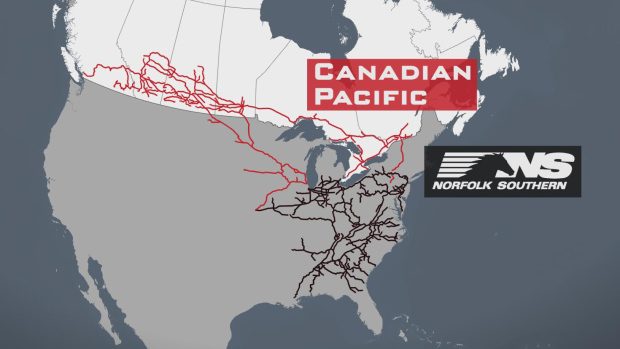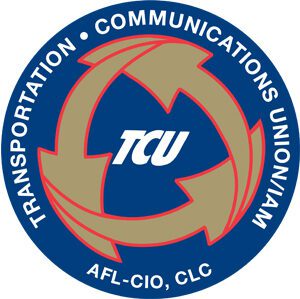
Canadian Pacific (CP) CEO Hunter Harrison has faced a wall of opposition ever since announcing his intention to merge his company with Norfolk Southern (NS) last November. And that wall includes NS itself.
On Dec. 7th, NS released a “white paper” that outlined the various reasons why a merger would be unwise, including the viability and profitability of a merger as well as its ability to stand up to federal scrutiny. The report was written by two former members of the Surface Transportation Board (STB) – the very agency tasked with approving a merger based how it would serve the public interest.
For union members working on NS, the impact is fairly certain: a merger between the two companies would be devastating. Some market analysts believe as much as a third of NS workers could lose their jobs from “synergies” and an adoption of CP’s notoriously bare-bones business model.
Another major concern is over what subsequently might happen should the merger succeed. “Assuming the merger goes through, the remaining Class 1’s will have litte choice but to combine,” says Railway Age Editor-in-Chief William Vantuono. He beleives some sensible mergers to follow might include Union Pacific with CSX, and Canadian National (CN) with Burlington Northern Santa Fe (BNSF). These resulting mergers themselves would mean even more jobs lost with estimates in the tens of thousands.
And despite large opposition, CP isn’t quitting. CP’s Harrison and its activist-investor/advisor Bill Ackman are pulling out all the stops to get a merger through. The CP duo has been active in the press, making the argument for greater efficiency while trying to allay legal concerns over their suggestion of a hostile takeover bid – a method by which they could merge by making an offer directly to NS shareholders, circumventing NS’s Board of Directors and management. But as Forbes Magazine described, that route seems dubious at best:
“…At face value, Harrison and Ackman are offering Norfolk Southern investors a terrible deal.
They are dismissing the certainty of cash and are not using a standard stock exchange ratio when describing upside to Norfolk Southern investors. They offer no antitrust concessions on what is clearly an aggressive horizontal merger, and embrace a deal structure not used since the 1990s. They won’t even give firm assurances regarding regulatory approvals in a merger they proclaim will fundamentally change how the rail market operates on pricing, network access, and the use of hubs across the continent…”
Fortunately, labor isn’t alone in this fight. Shippers, manufacturers, utilities, and others have written to the STB about their deep reservations in how a merger would negatively impact commerce, reduce jobs and wages, and potentially put workers and the general public in danger.
Opposition Mounting
In the last month alone, the uphill battle CP is facing has only gotten steeper as more and more interested parties have come out opposed. For our part, TCU sent a letter of opposition last week to the STB. SMART Transportation Division followed suit earlier this week.
As mentioned, letters from labor have joined the chorus of opposition to the merger on Capitol Hill and throughout the country. Here is a sorted list of those opposed to a merger:
Labor:
Capitol Hill:
- Illinois Congressional Delegation
- Illinois House Republicans
- Virginia Congressional Delegation
- House Judiciary Chairmen
- House Transportation & Infrastructure Ranking Members
- U.S. Senators Johnny Isakson and David Perdue (GA)
- U.S. Senator Tammy Baldwin (WI)
- U.S. Senator Amy Klobuchar (MN)
State Government:
- Virginia Governor Terry McAuliffe
- Georgia Lt. Governor Casey Cagle
- West Virginia Lt. Governor Bill Cole
- West Virginia Municipal League
- South Carolina Senate Transportation Committee
- South Carolina DOT Commission Chairman Rozier
Business Groups:
- Indiana Manufacturers Association
- Pennsylvania Manufacturers Association
- Pennsylvania Chamber of Business and Industry
- West Virginia Manufacturers Association
- West Virginia Coal Association
- Kentucky Association of Manufacturers
- Michigan Agri-Business Association
- Palmetto AgriBusiness Council
- Auto Alliance and Global Automakers
- South Carolina Chamber of Commerce
Companies
UPDATE (1/19/16): Since posting this blog, the head of the Federal Railroad Administration (FRA) told the Wall Street Journal that the agency has concerns associated with combining CP and NS. And while the FRA doesn’t have the authority to block a merger, its voice could carry weight with the members of the STB – especially with those that recall the tragedies that followed the Union Pacific and Southern Pacific merger in the late 90s.
Here’s an excerpt from the WSJ article:
“…a member of the Surface Transportation Board, Deb Miller, said in an interview that the agency’s mandate includes ensuring any merger is in the public interest and that it promotes competition. “Without question, safety is very likely to come up, but it’s going to come up under that broader question of public interest,” she said.
Federal safety officials have zeroed in on mergers before when searching for the cause of safety lapses at major freights. The National Transportation Safety Board held a special hearing in 1998 into Union Pacific, after a series of accidents that killed workers and some members of the public following its merger with Southern Pacific the year before. The agency criticized Union Pacific management at the time for insufficient procedures governing employee workload and train dispatching.
The FRA blamed the incidents in part on a “corporate culture in the merged Union Pacific and Southern Pacific railroad companies [that] had varying attitudes toward safety and a primary focus on improving operational efficiency instead of safety.”

